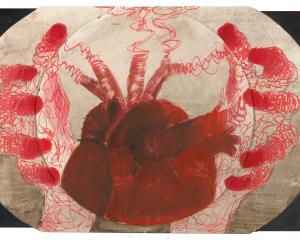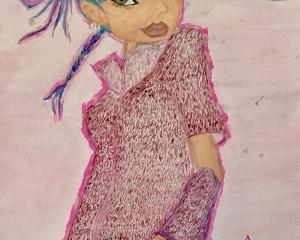
Year 12 Otago Girls’ High School
Growing up as a person of colour in New Zealand is like experiencing the five stages of grief.
At first, you try to fight it. Then you begin to accept it with bittersweet feelings.
In Karlo Mila’s poem "Eating Dark Chocolate while Watching Paul Holmes’ Apology", the experiences of the persona highlight to the reader that there are stages to growing up with racism in Aotearoa.
In this poem, Mila shows the reader a collection of a persona’s memories, triggered by Paul Holmes calling Kofi Annan a "darkie".
At the poem’s beginning, Mila introduces us to this childhood persona who is coming across different types of racism.
At 6 years old, this child is thankful to only be "a glass and a-half" so that she could be "safe from dark and bitter accusations". This shows how racism causes children of colour to lose their innocence at a young age.
It’s the first stage of growing up with racism in Aotearoa: recognition. It has just dawned on you that you are brown. As children, we couldn’t care less about colour and the effects of slurs and the meanings of words. We simply repeat them.
However, it’s not until the next stanza that the persona becomes aware of the real-life implications of racism.
"What does lynching mean, maka?" asks the now 10-year-old persona. In this stanza, the author introduces the second stage of growing up with racism in New Zealand: hope.
The persona’s recognition of life under racism is through a memory of watching a film with "black men with hurt in their eyes". The persona is hopeful as she goes on to believe that she can "be a lawyer like matlock" or "the prime minister". An almost naive approach to take.
To know what this 10-year-old child is about to experience and to watch her hope for the future is to know that there may be no hope in our society at all.
The 15-year-old persona, as expected, loses the hope that the 10-year-old once had. Mila doesn’t hesitate to show the reader the tragedy of the third stage of racism: heartbreak.
It’s hard to fight back against an embedded system such as racism. Especially when you’re a teenager, watching the "Mattel man" getting worshipped while "darkies" get "set up" like "fetishes". The word "fetish" symbolises that New Zealand society often views racism as a taboo subject.
It has become so integrated within our communities, but we refuse to acknowledge it. She "can’t make everything alright for darkies everywhere". But the racism journey doesn’t end here.
As the persona grows into an adult, Mila takes us to the final step: resolve.
To accept one’s fate is considered cowardly in many situations, however, for this persona, it is the bravest thing she could do. The events of this poem have shaped her to accept that she must make peace with her situation.
The persona is a mere "member of the chocolate soldier movement". She believes she can strive to build more for her children, so they don’t have "stanzas of darkie memories".
Every person of colour in New Zealand must learn to entertain racism. Not to fight or end, but entertain.
New Zealand society is arguably worse than other societies where people are aware of racism. The problem in New Zealand is that there is no awareness of what is racist.
"I’ve hurt my family, I may have hurt yours," Paul Holmes said in his empty and insincere apology.
The use of the modal verb "may" shows that he doesn’t realise what he has really done. People in New Zealand don’t know if they’re racist because as a society we reject the idea completely.
Therefore, as a person of colour, the only solution is to trick the system. Play with it, deceive it, and win at the games you play.
The stages of growing up with racism in New Zealand are portrayed as events that have shaped the persona’s strategies for dealing with racism in New Zealand.
Mila invites the reader to consider if there really is anything that we can do to solve racism, or if we are forever stuck in never-ending "stanzas of darkie memories".












